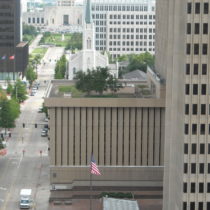Landscape Architecture for Landscape Architects › Forums › SUSTAINABILITY & DESIGN › Greywater/Irrigation design
- This topic has 1 reply, 7 voices, and was last updated 16 years, 1 month ago by
 Richard Longman.
Richard Longman.
-
AuthorPosts
-
August 13, 2009 at 11:49 pm #173284
 Emily W.Participant
Emily W.ParticipantHere’s a question for all you LAs out there with experience in the field. As a newbie to landscape architecture (just started the UCLA Extension program, considering grad school) I’m just feeling out my interests, etc. But being in Southern California I am very interested in the water issues and solutions for both residential/commercial clients.
From your experience – do LAs get to be very involved in the process when designing a greywater system for a residence or commercial building? Anyone have firsthand experience with this? I’d imagine even if the architects/engineers on the team are designing the actual system the LA would need to be the one who dictates where the irrigation happens from there – right? I know the whole ‘greywater’ thing is still very experimental and involves all kinds of involvement on the part of the consumer – using special soaps and products, etc – but here in SoCal with so much residential $$ and so little water, it’s started to catch on.
And just to be clear, this is about recycling the greywater in homes and commercial buildings – from washers, dishwashers, showers, sinks, and toilets – for landscape irrigation purposes – not rainwater collection and use.
Thanks in advance!
Best
EmilyAugust 14, 2009 at 2:30 pm #173293 Richard LongmanParticipant
Richard LongmanParticipantI think you’re definition of gray water is confused. The UPC (Uniform Plumbing Code) definition for single family dwellings define gray water to exclude household waste water that comes in contact with toilet waste and also doesn’t include wastewater from kitchen sinks and dishwashers.
In most areas these other waste are often referred to as blackwater.
I think you can see that this would involve two seperate plumbing systems for a building and this becomes an up front expense. Currently some states don’t allow the reuse of any waste water and that is presently the case in Louisiana.
However, I did work on a project in Florida years ago where they used were able to tap into the local treatment plant discharge for water for all of the projects landscape irrigation. The city even assisted in the cost. So there is some movement out there.
I think to really get a change made there will need to be some political pressure by landscape architectus to convince governing authorities to change the way they do business.
August 14, 2009 at 4:32 pm #173292 Michael RoyParticipant
Michael RoyParticipantI worked on a Government job in Canberra, Australia where a full grey water recycling system was installed. The grey water system provides water for flushing the toilets and irrigating the landscape. As the Landscape Architects we didn’t have much to do with the design of the system and just designed the planting etc. The practice of grey water recycling over here is only happening because we have been in drought for as long as I can remember and water restrictions don’t allow for watering of landscapes with potable water. Most jobs though seem to talk about using grey water recycling and then when costs come through it gets reduced to rain water tanks and storm water harvesting.
Likewise to some other comments black water recycling without treatment is not allowed here in Aus though I am currently working on a freinds property where they are off the grid for water supply, storm water and sewerage. They have a home treatment plant going in however there are still strict guidlines. All of the water must be released underground or a sufficient layer of mulch and be a certain distance from the residence. That said we are still proposing a swale system and range of wetland plantings (of course there is the extra challenge of using Aus natives which are used to growing in low nutrient soils now in a place where relatively high levels of nutrients will be present in highly soluble forms).
In the end I think it comes down to dollars and what regulations allow.
Also when I was in Perth I sat in on a talk by a hydrolic consultant who has worked on jobs around the world he said that recycling grey water (showers, baths, washing machine and sinks excluding the kitch sink) is the cheapest form of water, as in Aus there is relatively little rain but we are still using water everyday in the house. So installing a small residential system that is instintanious ei doesn’t require storage provides plenty of water on a fairly regular basis. These simple systems are just a pump hooked up the the plumbing that divert water into the pump and out into underground aggregate pipes (the types usually used behind retaining walls etc to remove water from the soil).
Anyway I have hope for grey and black water recycling we just have to wait for the real price of potable water to be passed on to the consumer with no government subsidies.August 14, 2009 at 4:37 pm #173291 Emily W.Participant
Emily W.Participantthanks for the clarification, I did mean greywater as in usable wastewater and not the blackwater from sewage. But in these situations, who actually does the irrigation design?
August 14, 2009 at 5:15 pm #173290 Michael RoyParticipant
Michael RoyParticipantWell in most cases the system is designed by hydrolic engineers and irrigation designers (usually linked with suppliers / contractors) I know sometimes LAs can be involved in discussions as is the case with a new council building in Perth, WA. Check out http://www.newforms.com.au/ and look at the Cottesloe, Peppermint Grove & Mosman Park job, maybe send them an email they should be able to give you some more info – even if it is from an australian perspective.
August 14, 2009 at 10:41 pm #173289 Richard LongmanParticipant
Richard LongmanParticipantI recently had the need for an irrigation design for a project and was referred to the Irrigation Association. They have a cerification program for irrigation designer (CID). Some of the people I contacted were irrigation contractors and some were landscape architects.
I suspect if the design involves tying into a facilities plumbing system that would probably be designed by an engineer, whom I suspect could also design a irrigation system but doubt that they would because of the higer fees.
August 15, 2009 at 6:10 pm #173288 Bob LutherParticipant
Bob LutherParticipantI have been asked to use reclaimed water for many recent projects. I am finding that many municipalities and water districts are providing more opportunities to work with reclaimed water. the biggest limitation is access to the supply lines, if the supply is available then the only design changes needed are the use of purple components and sometimes signage warning not to touch or interact with the water. In the past the irrigation components would breakdown due to the high levels of chlorine in the water, but irrigation companies are modifying their valves, heads, and pipe to deal with these conditions.
As for true “gray water” from what I have read it is mostly contained and recycled within the building. As you wash your hands or dishes or take a shower this water is collected in a cistern to then fill the toilets, becoming “black water” which is then transported to the water treatment facility for processing into reclaimed (NON-POTABLE which is treated but not to the same extent drinking water is) and drinking water (added processes are used to convert this water) and then the water is sent back into the “system” for re-use. There are systems that push gray water into the landscape for irrigation and these systems could be used by landscape architects, but i have yet to see these systems in used on a project. See attached images.
August 17, 2009 at 10:53 pm #173287 Kathleen BrandParticipant
Kathleen BrandParticipantThere is a company in San Diego called Re-Water, that designs and installs greywater systems. Even they say the systems are expensive to install. They are more cost effective on new home design and very costly to retrofit an existing home. Each community has there own regulations on greywater use. There are no state guidelines, at least not in California. The entity that regulates it’s use is the health department. In San Diego greywater systems may be installed on residential sites. No sprays can be used in the irrigation design and all drip emitters must be 9″ minimum below grade.
If you are lucky enough to have access to reclaimed water (the purple pipes) you can tap into that system for irrigation. I have not seen it used on individual residences, only for large commercial properties, school fields, parks and streetscapes. A good portion of the reclaimed water is dumped into the ocean because of lack of consumers. There are not enough people using reclaimed for irrigation and the water authorities are not willing to spend the money to put in more pipes to get it to the consumers.
There is no end to the debate on water needs in California and the lack of supply.
January 16, 2010 at 10:04 pm #173286Jeremy Sison
ParticipantEmily,
I have a client here in San Diego (Rancho Bernardo) who is rebuilding their home that burned in the 07 fires. They want to irrigate 2 level areas on the property with a grey water leachfields. I did some research and the state of California has guidelines as part of the California Plumbing Code (CPC). Here is the link http://www.documents.dgs.ca.gov/bsc/Title_24/documents/2007/2007%20Part%206/2007-CPC-Errata.pdf The gray water section starts in Appendix G or page 38 of the PDF.This is my first time exploring the design, permitting and installation of a gray water system. I still need to find out if it is legal in San Diego county. If you or anyone else has an info or experience with any of these aspects of a grey water system I’d really appreciate the insight.
Jeremy
January 27, 2010 at 7:07 pm #173285 Bryan BaileyParticipant
Bryan BaileyParticipantI have had a similar experience with ‘greywater’ systems in Portland, OR. These are usually part of the municipal systems and are classified as ‘non-potable’. I think that it is possible to use ‘greywater’ for irrigation on commercial projects – but my instincts tell me that arch / land arch don’t do it because the permitting process and long term maintenance would be a nightmare.
However, for residential work, I believe there is an easier permit process you can go through. I think a licensed plumber needs to be involved in this process. As for ‘Blackwater’ (toilet water), this can’t be done, as far as I know. -
AuthorPosts
- You must be logged in to reply to this topic.


